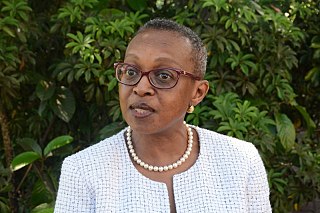
The Joint United Nations Programme on HIV and AIDS (UNAIDS) is the main advocate for accelerated, comprehensive and coordinated global action on the HIV/AIDS pandemic.

World AIDS Day, designated on 1 December every year since 1988, is an international day dedicated to raising awareness of the AIDS pandemic caused by the spread of HIV infection and mourning those who have died of the disease. Government and health officials, non-governmental organizations, and individuals around the world observe the day, often with education on AIDS prevention and control.

Ann Margaret Veneman was the Executive Director of UNICEF from 2005 to 2010. Her appointment was announced on January 18, 2005 by UN Secretary-General Kofi Annan. Previously, Veneman was the United States Secretary of Agriculture, the first, and as of 2018 the only, woman to hold that position. Veneman served as USDA Secretary from January 20, 2001 to January 20, 2005, leaving to become the fifth executive director of UNICEF. She served in this position from May 1, 2005. A lawyer, Veneman has practiced law in Washington, DC and California, including being a deputy public defender. She has also served in other high level positions in U.S. federal and state government, including being appointed California's Secretary of Food and Agriculture, serving from 1995 to 1999.

According to National AIDS Control Organization of India, the prevalence of AIDS in India in 2015 was 0.26%, which is down from 0.41 in 2002. While the National AIDS Control Organisation estimated that 2.11 million people live with HIV/AIDS in India in 2015, a more recent investigation by the Million Death Study Collaborators in the British Medical Journal (2010) estimates the population to be between 1.4–1.6 million people.
Human immunodeficiency virus and acquired immune deficiency syndrome in Burma, recognised as a disease of concern by the Ministry of Health and is a major social and health issue in the country. In 2005, the estimated adult HIV prevalence rate in Burma was 1.3%, according to UNAIDS, and early indicators show that the epidemic may be waning in the country, although the epidemic continues to expand in parts of the country. Four different strains of HIV are believed to have originated from Burma, along heroin trafficking routes in northern, eastern and western Burma.

Firdaus Kharas MA, LLD (hc), DHum (hc) is a social entrepreneur and media producer. He founded Chocolate Moose Media in 1995 to produce for-profit and not-for-profit content for film and television aimed at progressive behaviour change. Using media to achieve this goal is vital in today's world, according to Carleton University's Technology Innovation Management Review.

Awa Marie Coll-Seck, is former Executive Director of The Roll Back Malaria (RBM) Partnership and is on the Board of Directors at the Program for Appropriate Technology in Health (PATH), Medicines for Malaria Venture (MMV), Innovative Vector Control Consortium (IVCC) et al.
Prostitution in Paraguay is legal for persons over the age of 18, but related activities such as brothel keeping are prohibited. Prostitution is common in the country. Brothels are also common, even some rural villages have a small bar/brothel on the outskirts.
Prostitution in El Salvador is not prohibited by national law, but may be prohibited by local municipal ordinances. Municipal ordinances may also prohibit the purchase of sexual services. Related activities such as facilitating, promoting or giving incentives to a person to work as a prostitute (pimping) are illegal. The prostitution of children is also illegal. Brothel ownership, however, is legal. There are no specific laws against human trafficking, but any criminal offence that includes ‘commerce in women or children’ requires sentencing to be increased by 30%.

An orphan is someone whose parents have died, are unknown, or have permanently abandoned them.
Purnima Mane is an internationally respected expert on sexual and reproductive health who served as the President and CEO of Pathfinder International, a post she held between February 2012 and April 2016.

UNICEF UK, also known as the United Kingdom Committee for UNICEF, is one of 36 UNICEF National Committees based in industrialised countries. The National Committees raise funds for the organisation's worldwide emergency and development work. In 2007, UNICEF UK raised £41.3 million for UNICEF’s work with children worldwide. UNICEF UK also advocates for lasting change for children. For example, it works to change government policies and practices that are detrimental to children’s rights in the UK and internationally.

Michel Sidibé is the Executive Director of UNAIDS and Under-Secretary-General of the United Nations since 1 January 2009. On 13 December 2018, Sidibé announced his resignation in June, 2019 in the wake of an expert report on sexual harassment in UNAIDS that claims that he fostered a work environment that tolerated bullying and sexual harassment, among the staff.
The first HIV/AIDS case in Malaysia made it debut in 1986 and since has become one of the country's most serious health and development challenges. As of 2016, 99,338 HIV positive men and 12,578 HIV positive women in Malaysia.

North Korea has a life expectancy of 71.69 years as of 2016. While North Korea is classified as a low-income country, the structure of North Korea's causes of death (2013) is unlike that of other low-income countries. Instead, it is closer to the worldwide averages, with non-communicable diseases – such as cardiovascular disease – accounting for two-thirds of the total deaths.

The UNICEF East Asia and Pacific Regional Office, also known as UNICEF EAPRO, is one of seven regional offices that support the work of the United Nations Children's Fund. Globally, UNICEF works to promote children's rights in over 150 developing countries.
Luiz Loures was the Deputy Executive Director, Joint United Nations Programme on HIV/AIDS (UNAIDS). He was appointed to this position by the United Nations Secretary-General Ban Ki-moon on 14 December 2012.
Elhadj As Sy is the Secretary General of the International Federation of Red Cross and Red Crescent Societies (IFRC), appointed on 1 August 2014.

Dr. Matshidiso Rebecca Natalie Moeti is a physician, public health specialist and medical administrator. She is the current Regional Director of the WHO Regional Office for Africa (AFRO), headquartered in Brazzaville, the Republic of the Congo. She was appointed to that position on 27 January 2015, by the World Health Organization's Executive Board, sitting at its 136th session, in Geneva, Switzerland. She assumed office on 1 February 2015, to serve a renewable five-year term. This followed the endorsement of the health ministers of the 47 member countries in the Africa Region, at their meeting in Cotonou, Benin, in November 2014. She replaced Dr. Luis Gomez Sambo of Angola, who served as the Director of AFRO from 2005 until 2015.











